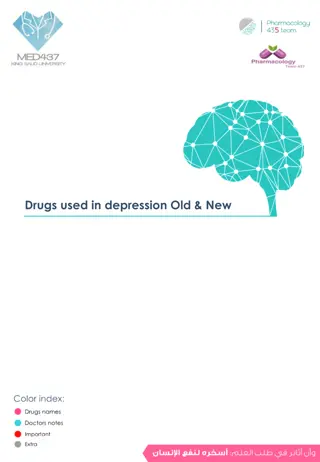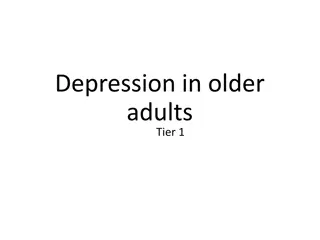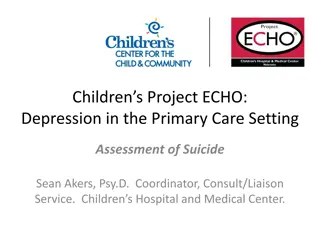Understanding Depression in Sikhism: Insights from Guru Granth Sahib
Explore the link between depression and Sikh beliefs as portrayed in Guru Granth Sahib. Learn about the symptoms, therapeutic strategies, and the Guru-Chela relationship, offering a unique perspective on addressing mental health challenges within the Sikh community.
Download Presentation

Please find below an Image/Link to download the presentation.
The content on the website is provided AS IS for your information and personal use only. It may not be sold, licensed, or shared on other websites without obtaining consent from the author. Download presentation by click this link. If you encounter any issues during the download, it is possible that the publisher has removed the file from their server.
E N D
Presentation Transcript
Ground Rules 1. Punctual attendance 2. The whole book/article of the month must be read 3. Come with an open mind 4. Share your learning and listen to others 5. Keep the discussion relevant 6. Respect each others confidentiality
Introduction Guru Granth Sahib is the guide for leading a pious and good life. Comprises the teachings of all 10 Gurus, along with those of other poets and religious leaders from Hindu, Sufi, and Islamic traditions. The religion, like other religions, has its own rituals and taboos, myths, and fundamental values. Any interpretations of the religion must take into account these cultural, social, and political contexts in which the religion emerged and subsequently developed. Paper attempts to explore the concepts of modern depression in the Guru Granth Sahib and try and develop some therapeutic strategies that followers of Sikhism may find helpful. Improve assessment and treatment, as well as promote public health through education and tackling stigma.
Sikh Beliefs Primary importance given to the Lord at all points Man considered a being of lesser importance? Countless names and qualities Pain and suffering are at the core of reincarnation Human life considered highest life form Thoughts at death influencing the next life Karma Manmukh vs Gurmukh Illness should be seen in a systematic manner where diet, environment, and other factors also affect the individual, the illness, and response to illness.
Depression in Guru Granth Sahib Ji Authors studied both Gurmukhi and English translation Assumption that Dukh = depression Mind cannot feel physical pain Dukh comes from the Lord (a curse) - contributes to lack of professional help Aetiology Forgetting the Lord (and forgetting oneself) Karma Bereavement Taunts, hypocrisy, loss of wealth Alcohol 5 chor Love of Maya
Symptoms & Therapeutic context Myriad of symptoms described Therapeutic effects of meditation Different methods of praying e.g. Ardas, Bhagti, listening to Saakhis Importance of simran and seva for happiness Importance of the Lord's name? Gurbani places emphasis on Godas being an external locus of control As opposed to the individual Offers a way to manage the dilemmas in society Why is there so much suffering? Is suffering to be endured?
Guru Chela Relationship The Guru as a therapist The positive effects of the Guru's sermons (e.g. reduction of sorrow and prevention of melancholy) Guru's advice to renounce desire and seek Nirvana Avoidance of blame Guru reveals the path to peace Pain and ego do not go away without the Guru
Conclusion Guru Granth Sahib Ji as a spiritual guide for Sikhs References to modern depression (causes and symptoms) Relevant therapeutic issues related to depression May be useful in modern context and clinical scenarios Need for an understanding of these descriptions when dealing with Sikh patients in distress























